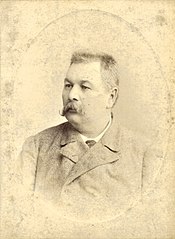Marko Kropyvnytsky

Marko Lukich Kropyvnytsky (May 10 (22), 1840 – April 8 (21), 1910) – Ukrainian playwright and theater figure.
Marko was born in the village of Bezhbajraky (now – Novoukrainka district of Kirovograd region) in the family of a small official. He studied at different primary schools, and in 1853 – 1856 – in Bobrynets district school. After graduating from school, he enlisted in the county court and had the intention to become a lawyer. In 1862 – 1863 he studied at the Law Faculty of Kyiv University, but did not finish it (he listened only to three semesters).
From Kiev, Kropyvnytsky returned to court in Bobrynets, and in 1865, in connection with the transfer of county offices to Elisavetgrad, he moved to this city, where he served until 1871.
(For the Russian occupation, Elisavetgrad was long called Kirovograd, and in 2016, under the law of decommunization, it was given the name Kropyvnytsky.)
In 1871 Kropyvnytsky sold his property in Elisavetgrad, moved to Odessa and since then devoted himself a solely Ukrainian theater, becoming one of the first professional theatrical figures in Ukraine. He died in 1910 when he traveled on a train from Odesa to Kharkiv. Buried in Kharkiv, preserved as a historical monument.
Kropyvnytsky’s inclination towards literary work was revealed even during his studies at the Kiev University. In 1863 he wrote his first drama "Nikita Starostenko", which was then represented in the theater. (In 1873, this drama was essentially reworked by the author and entitled "Give heart to will, will lead to captivity"; had a great success on stage.)
The playwright Kropyvnytsky was the most prolific period of the 1880s, when his most famous works were written, in particular, the drama "Profiteer, or Spider». Total Kropyvnytsky wrote 41 dramatic works, among them – dramas, comedies, vaudevilles, dramatization of prose works and remakes of plays by other Ukrainian authors.
The themes of his works are the life of Ukraine (from the 1850s to the 1900s), from the last years of serfdom to the events of the revolution in 1905. The circle of his observations was Ukrainian peasants, rural government officials, burghers, nobles (in fact, the landlords, who most faced with peasants). Plots of plays are based on domestic and social conflicts. He did not touch national issues in his writings, just as he did not write on historical themes.
One of the main problems of his works is the decline of the once omnipotent landowners and the birth and consolidation of a new category of rich people – the profiteers from yesterday’s peasants. These themes were developed by him both in comic and dramatic plans.
Despite the lack of Ukrainian national issues (always unpleasant for censorship), Kropyvnytsky’s plays were constantly subjected to censorship and harassment. The reason was the mercilessly true picture of social contradictions in Ukraine. These harassment (along with purely creative considerations) compelled the author to continually rework his works, some of which are known to us in several editions.
Plays written by Kropyvnytsky did not lie in the drawer – they were printed and constantly represented in theaters. Kropyvnytsky, speaking on stage from 1871, showed himself a talented actor, and soon began to work in parallel as a regisseur.
In 1882, Kropyvnytsky in Elisavetgrad organized his own theatrical troupe, which attracted Mykola Sadovsky, Maria Zankovetska, Panas Saksagansky, Ivan Karpenko-Kary and others. This collective, aptly called the "Coryphaeus Theater", changing its organizational forms, has been the leading in theater life of Ukraine for more than 30 years. It gave theatrical life to many plays by Ukrainian playwrights of the time, including Kropivnitsky himself.
, which we present, was performed in the 1890s. It is stored in the funds of Kropyvnytsky Regional Museum of Local Lore.
M. Zh., December 12, 2017
